- Home
- S. D. Perry
Star Trek: Inception Page 6
Star Trek: Inception Read online
Page 6
Mac kept his game face on, but Tam looked miserable, already completely scared back into her shell by Verne’s insistent attention. Carol would have to take him aside at some point— soon—and try to explain a few of the intricacies of living in a small, highly focused project group.
My project group, she thought, and as Verne prattled on, proclaiming his rapture at being a “team player,” she felt another sudden, unhappy lurch of her stomach and decided that she definitely should have stayed in bed.
The first open-to-all panel—a reveal of the projected time line for Federation expansion over the next decade, as well as specific missions setting out in the upcoming year—wasn’t scheduled until early afternoon. The morning of the summit’s first day, it seemed, was devoted to chaos. Arriving Starfleet personnel milled about in the lobby of Boston’s Federation Assembly Hall, mixing with Federation ambassadors, representatives from a dozen worlds seeking membership, grand administrators and lower-echelon management from around the galaxy. Captain Olin had already introduced Kirk to an endless parade of unfamiliar faces, finally excusing himself to talk shop with someone or other, leaving him to fend for himself.
Kirk stood near the lobby’s far wall, looking over his agenda slate as people swarmed past, the handful of musical languages being trans lated simultaneously creating a low roar. There were lists of visiting ambassadors, timetables for panels open and closed, short treatises on everything from possible general order amendments to recommendations for SCE projects. It was his first Federation summit, and while Kirk wanted to make the most of it, make connections, he felt a little overwhelmed. He’d gotten used to a closed environment.
“Jim? Jim Kirk?”
Kirk looked up, startled to see a somewhat familiar face, one he hadn’t seen in a long time; it took him a moment. The man wasn’t much older than himself, wore civvies, had light hair and a beaming grin. An attractive young blonde stood at his side, the similarities in their facial structure suggesting that they were related.
“Paul Marshall,” the man offered, just as it occurred to Kirk. Marshall had been one of the science cadets on the U.S.S. Republic, from the Academy days. He was usually better with names, but seeing Marshall out of uniform had thrown him.
“Paul,” Kirk said warmly, shaking hands. “I didn’t recognize you, keeping company with someone so attractive.”
The blond woman smiled, and Marshall threw one arm around her shoulders, mock- growling at Kirk. “Watch it, Commander. That’s my sister you’re talking about.”
“Janet Marshall,” she said, shrugging off her brother’s arm. “Nice to meet you.”
“Jim Kirk, and he’s not someone you want to have anything to do with,” Marshall said. “Not unless you want to take a place in line. Jim had about a dozen girlfriends back at the Academy, if I remember right. And half the gals on the Republic.”
Kirk rolled his eyes as he shook hands with Janet. “Your brother has a talent for exaggeration.”
“And you’ve got one for understatement,” Janet replied. Her smile was lovely, her voice soft and very feminine. “According to Paul, every man in Starfleet is a raging lothario. Or at least every one he’s introduced me to this morning.”
“Perhaps meeting you is an inspiration,” Kirk said, and Janet laughed.
“Enough already,” Marshall said. “Jan, you’re going to be late ?”
“Right. It’s been a pleasure, Commander.” She turned to her brother. “Paul, I’ll see you this evening?”
Marshall nodded, and with a final smile and wave, the young Miss Marshall disappeared into the crowd.
“She’s an intern with the FSC,” Marshall said. He was obviously proud. “Studying endocrinology. Though she’ll probably end up in the private sector rather than Starfleet. Less backing but more freedom.”
“Is that where you are?” Kirk asked. He remembered that Marshall had been a research chemist of some sort.
“Yep. Good thing, too. If I’d stayed in, I’d have ended up having to call you sir.”
Kirk laughed. The two men chatted amiably a moment, catching up on shared acquaintances, on personal achievements. Marshall was head of R & D for a company that manufactured pharmaceuticals and was attending the summit in a professional capacity. The company he worked for had a contract with Starfleet.
“Head of your division,” Kirk said. “Impressive.”
“Thank you. I don’t know if it has anything on making commander, though. You’re on the fast track, Jim.”
Kirk shrugged, pleased in spite of himself.
“You want to see something really impressive?” Marshall asked.
He pulled a small flat object from a pocket, held it out. Kirk took it. It was a capture print, a smiling woman with red hair holding a grin ning baby, the child perhaps six months old.
“Marie and Paul Junior,” Marshall said.
“Beautiful.” Kirk studied the picture a moment longer, the woman’s kind eyes, the baby’s chubby fists in his lap, then handed it back. “Really, a beautiful family.”
“Something else I couldn’t have done, if I’d stayed in.”
“People in Starfleet don’t have families?” Kirk smiled.
“Do you?” Marshall asked. When Kirk hesitated, Marshall nodded, his expression knowing.
“Not yet,” Kirk protested. “Someday.”
Marshall’s look said volumes. Kirk shrugged again, inwardly this time. To each his own.
“Like I said,” Marshall said. “Anyway. I’ve got to get back to the hotel, do some research for my afternoon meeting. Walk me out to the pads, if you don’t have anything better to do.”
Marshall nodded at Kirk’s uniform, smirking. “Maybe you can incite the protestors.”
Kirk walked with him toward the lobby doors. “They’re here?” he asked. “I thought their support rally was yesterday.”
“It was, but you think they’re going to pass up the extra coverage?”
Kirk barely heard him as they stepped outside and were confronted by a sea of activity that made the summit chaos seem almost orderly.
So many, Kirk thought, studying the yelling crowd that pressed against the low-grade force barrier that lined the walk to the transporter pads. There were a few hundred of them, at least, most dressed in garish, youthful fashions, talking, singing, many holding signs or flags that spoke for them. Some of the signs were quite sophisticated, animated holopic images and professional logos; others merely looped through two or three generic antiestablishment phrases, repeated in multiple languages. The protestors nearest the lobby doors held their signs toward Marshall and Kirk, shouting. A group of young people who wore nothing but body paint and strategically placed flowers shook their fists at Kirk, one of them demanding that Starfleet “let evolution become.” Two of them carried guitars, another wore a drum around her neck.
“Does anyone take these people seriously?” Kirk asked.
Marshall shrugged. “Some of them have been invited to run counterpoint this year, on the summit’s last day. An open panel. Called ‘The Cost of Expansion,’ something like that.”
“Which ones?” As they started for the nearest transport site, Kirk had to raise his voice to be heard. “The naked teenagers? Are they going to debate, or sing a song?”
Marshall laughed, but Kirk wasn’t sure it was funny. He knew that there were environmentalist groups with legitimate concerns, but there were also whole branches of Federation science and admin designated to address such matters. What had gathered outside the summit was a much more radical element. Kirk was surprised that the organizers were granting them recognition of any kind.
One of the animated banners caught Kirk’s eye—the image of a beautiful, shining red marble of a planet—Mars, obviously—that faded, turned gray and dead, and finally burst into flame. Kirk frowned, annoyed by the obvious extremism. One of those gathered beneath the sign, a tall, lanky man in a blue suit, appeared to be in charge; he was speaking to a handful of netcams, his expression s
erious. As he and Marshall walked past the interview, Kirk caught some of what the man was saying.
“? But it’s not just about advancement versus apathy, moving forward or growing stagnant, as a culture. There are bigger issues here, questions about how we want to progress, and what it means to be progressive ?”
The man’s tone was as reasonable as his words; Kirk had to resist an urge to stop and listen. It seemed there was a semilegitimate group out there, after all, or at least one that wasn’t outright mad. But if their sign was representative of their reasoning, that made them far more dangerous than a thousand painted children.
The man in the blue suit locked gazes with Kirk, just for a beat. Kirk stared back at him, seeing intelligence, purpose, and ? anger. As though Kirk was personally responsible for whatever slight had brought him here, to stand outside a meeting place of sane and reasonable men, to ally himself with a carnival of disaffected youth and idealists grown bitter.
I see you, Kirk thought, and nodded, so slightly that it was perhaps imperceptible. Whether the man saw it, he couldn’t say. He continued speaking, and in another beat, was out of sight.
“Miss Kalomi?”
Leila looked up from the data slate she was reading, both startled and pleased that Mister Spock had found her. They’d made no plans to meet, but during yesterday’s interesting and informative walk, he’d said that he had visited the gardens every day of his leave thus far, and she’d hoped very much to see him again. It seemed that her lingering lunch by the entrance to the gardens had been well timed.
She set the slate aside, cleared away the remnants of her lunch so that he could sit next to her. As before, he was in uniform, and it occurred to her that she’d never seen another Vulcan wearing Starfleet. It suited him.
“Malus domestica,” he said, sitting, his voice without inflection.
She picked up one of the two remaining apples from her meal, nodding, unable to keep herself from smiling. She had brought them to eat, not as a conversation topic, but she found herself pleased that he knew the genus.
“Yes, but these are a little more than that.” She held up the small fruit. “They’re cross-pollinated with a fruit native to Ta’utre VII that has a much slower rate of decay.” A colleague of hers had worked on the grafted strain as part of her graduate thesis project, a fast-growing, high-yield variety that kept incredibly well. Leila had helped with the research, assisted with some of the fieldwork, and had been “paid” in apples, bushels of them. The apple she held was from one of the original crops, picked nearly a year before, but she knew it would taste as though it had just been harvested. She and Adam had gone through seeming thousands of the things ?
She swallowed that thought, looked up into Mister Spock’s intent gaze. He seemed entirely focused on her, on what she was saying, as he seemed to be every time she spoke. A Vulcan trait, presumably, one that she found ? flattering, in a way. As though he really wanted to hear each word.
“Was that grown on Ta’utre VII?” Spock asked. “It would explain the small size. Ta’utre VII’s gravity is slightly higher than that of Earth’s. Point oh-eight six, to be precise.”
“Yes, that’s right,” she said. “The trees are much smaller and straighter than the Earth variety, the branches more compact, but the yield is actually higher. And the fruit reaches maturity in about an eighth of the time. Also, these apples were cultivated specifically to be less acidic than any Earth variety, so they won’t trouble the stomach. Even the seeds are edible.”
Spock continued to study her, his gaze inscrutable. Leila realized that she was still holding the apple up and suddenly felt foolish. She lowered her hand. It was difficult to explain the excitement she felt talking about her field, the personal satisfaction. Adam had often teased her about it.
“Forgive me,” she said, smiling. “I tend to talk too much about things that would only be of interest to another botanist.”
“As I stated before, botany is an interest of mine,” Spock said.
“You did,” Leila said. He probably thought her hopelessly emotional, but he was so straightforward, so direct, that she couldn’t help smiling. “I probably enjoy talking about it a little too much, though.”
Spock’s chin lifted very slightly, and he blinked. “I believe it is only logical to take pride in the products of one’s study.”
She thought she detected a kindness in his gravelly voice, but perhaps she only wished it so. Was pride an emotion?
“Would you like to try one, Mister Spock?” she offered.
“Thank you.” As he took the fruit, his fingertips brushed against her palm, his skin cool against hers.
He took a bite, swallowed.
“I detect a particularly high concentration of fructose in this specimen,” he said. “But somewhat less pectin than one might expect.”
“That’s right,” she said. “It’s sweeter than most Earth varieties. Not too sweet, though. I mean, I hope not overwhelmingly so.”
“It is not. It is quite pleasant.”
Leila took a bite from the last apple, to hide another smile. She’d heard that Vulcans couldn’t lie, or didn’t, she wasn’t sure which, but it was a trait she could certainly come to appreciate. He was so honest, even his small acknowledgment of the apple’s taste was like a grand compliment.
They ate the fruit in silence, Leila enjoying the quiet, the soft sunlight, the company. Was Spock enjoying himself? She hoped so. He’d joined her, hadn’t he? Perhaps he was only being polite, but she didn’t think so. No, he could have said hello and gone on about his business. He’d stopped to sit with her because . . . because perhaps he was lonely, too. Vulcans didn’t express emotion, of course, but they were social creatures; they lived together, worked together. She knew she might be projecting a bit, but he’d told her that his captain had ordered him to leave his ship, to find something to do, and he’d obviously been at loose ends, visiting the Embassy Gardens every day.
And he told me he would be here, she thought, finishing her apple. If he wished to avoid me, he need not have said anything.
“Efficient food production is the nature of your research?” he asked.
“Holistically, I’d say yes, but my true focus is much narrower, concentrated more specifically on soil structure,” she replied. “The project I’ve just started working on involves altering the ratio of microorganisms to enzymes in Martian regolith. But if everything goes well, the applications will be practically universal.”
The Vulcan’s curiosity was clearly piqued. His head cocked and his dark, piercing eyes narrowed. “Applications?”
Leila nodded. “High-production agronomy using previously nonviable regolith.” She indicated the data slate on the bench next to her. “I’m still learning about it myself.”
“There are numerous studies concerning regolith terraformation for agronomous purposes,” Spock said. “An interesting field.”
“Yes, but this project will be groundbreaking,” she said, smiling at the play on words. Spock did not.
“In what way?”
“The team I’m working with has found a way to alter regolith chemical composition in a matter of hours, rather than months or years. Using nitrilin as a trigger.”
Spock frowned. Leila wondered if Vulcans were capable of surprise, decided that they had to be. A reaction wasn’t an emotion, was it?
“A volatile substance,” Spock said. “I was not aware that it had applications to terraformation.”
“I wasn’t either, but the data is sound.” She again nodded at the slate. “And they ? we’ve already received approval from the science council. And acreage on Mars for the fieldwork. We’ll be leaving Earth in just over a week.”
“Fascinating,” Spock said. “Might I access copies of this data?”
Leila hesitated. It would be unprofessional for her to leak project information to another scientist, or at least anyone not working for Kraden. But Doctor Marcus hadn’t specifically asked that they keep the data under
wraps. Not from friends and family, anyway. Spock wasn’t exactly her friend, but ? but she could trust him. She felt sure of it.
“Most of it hasn’t been published yet, it’s all based on recent research,” she said. “But it’s not restricted material. You should be able to access most of the relevant documents from the university mainframe, though you have to be a student or faculty to get to it. I could do a retinal scan for you on your computer, if you like.”

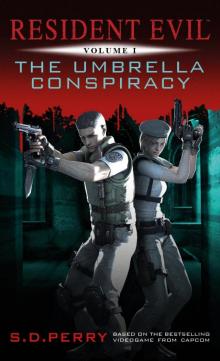 The Umbrella Conspiracy
The Umbrella Conspiracy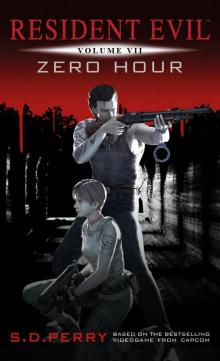 Zero Hour
Zero Hour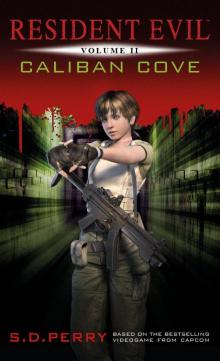 Caliban Cove
Caliban Cove Code: Veronica
Code: Veronica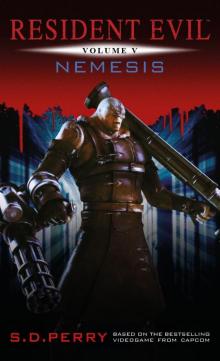 Nemesis
Nemesis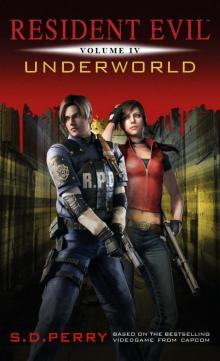 Underworld
Underworld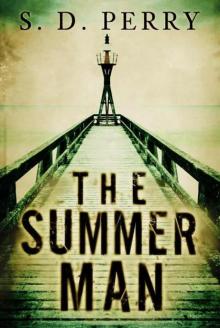 The Summer Man
The Summer Man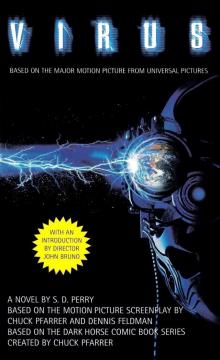 Virus
Virus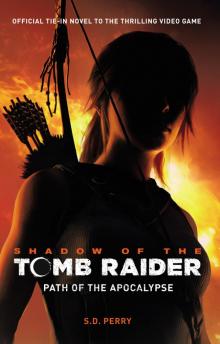 Shadow of the Tomb Raider--Path of the Apocalypse
Shadow of the Tomb Raider--Path of the Apocalypse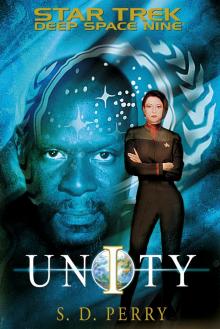 Unity
Unity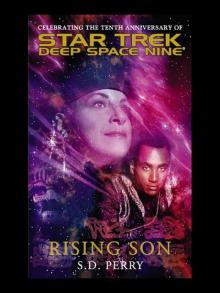 Rising Son
Rising Son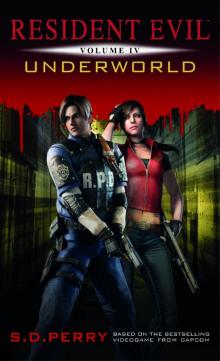 Resident Evil: Underworld
Resident Evil: Underworld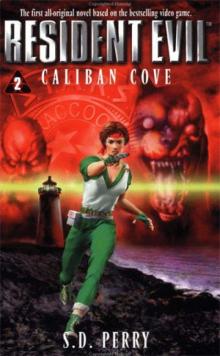 Resident Evil – Caliban Cove
Resident Evil – Caliban Cove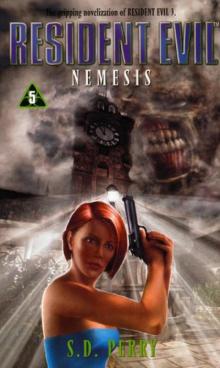 Resident Evil – Nemesis
Resident Evil – Nemesis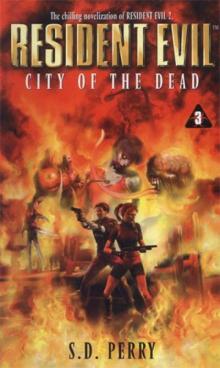 Resident Evil – City of the Dead
Resident Evil – City of the Dead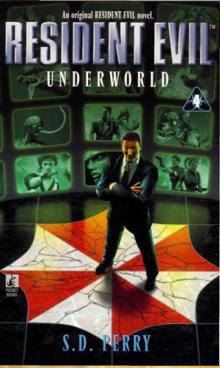 Resident Evil – Underworld
Resident Evil – Underworld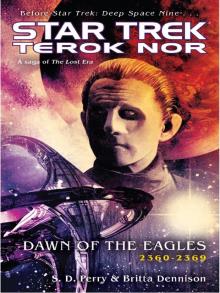 Star Trek: Terok Nor 03: Dawn of the Eagles
Star Trek: Terok Nor 03: Dawn of the Eagles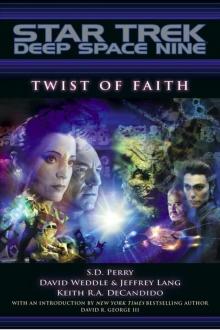 Twist of Faith
Twist of Faith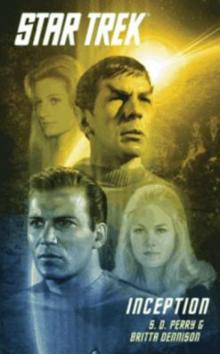 Star Trek: Inception
Star Trek: Inception Cloak
Cloak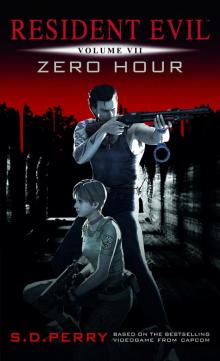 Resident Evil
Resident Evil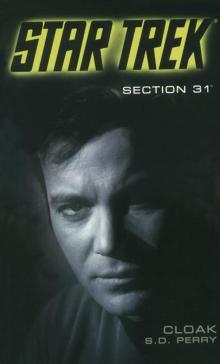 Star Trek - TOS - Section 31 - Cloak
Star Trek - TOS - Section 31 - Cloak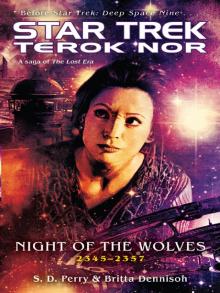 Star Trek: Terok Nor 02: Night of the Wolves
Star Trek: Terok Nor 02: Night of the Wolves